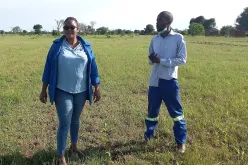Meet Melody Chali, 40 year-old Zambian, a single mother and a UN Volunteer Research Assistant with the UN Development Programme (UNDP) in Zambia. Melody began her UN Volunteer assignment in 2019 as part of the Scaling up Climate Ambition on Land Use and Agriculture (SCALA), a programme jointly implemented by UNDP and the Food and Agriculture Organization (FAO) that responds to the urgent need to cope with climate impacts in agriculture and land-use sectors.
At the start of Melody's UN Volunteer assignment in Namwala District in Southern regions of Zambia, she supported the programme's implementation in the remote District along with a senior agriculture government official. As part of her assignment, she conducted research on different well-being indicators and prepared various project documents, including concept notes, advisories, budgets, work plans and reports.
Now, as a Research Assistant for the SCALA programme, Melody works closely with camp extension officers in 15 camps in the District, building the capacity of farmers on various technologies and data management. Their goal is to increase the resilience of smallholder farmers in view of the impacts of climate change and variability. "We are now targeting 13,000 women, men, youth and local leaders to ensure no one is left behind in the developmental agenda of sustainable growth through a value chain approach in agriculture," explains Melody.
To help tackle the devastating impact of climate change in the country, Melody spends most of her time in the farm fields across the District, training farmers on conservation farming, crop diversification, environmental awareness and alternative livelihoods to help build more resilient communities.
"As a female volunteer, it is always challenging to convince farmers to move away from their old traditional farming methods and adapt new environmentally friendly technologies," says Melody. Fortunately, the journey has yielded fruitful and promising results - some farmers are now inter-cropping to reduce soil erosion and diversifying crop production to reduce food shortages.
Fourteen years of serving in different remote locations in four provinces have taught me to be resilient and achieve the change I want to see in rural communities. To me, that is volunteerism." -- Melody Chali, Research Assistant, UNDP Zambia
One of her most significant achievements in the project is the engagement of more women in Namwala in activities that they thought only men could do. For instance, most women in the 15 camps in the District can now make farm drip lines through the technical knowledge acquired through the programme, an activity initially mainly done by men. Additionally, more women are learning to increase their incomes through building better farm business value chains.
However, the problem of inequality remains in local leadership, property and land ownership - the culture remains largely patrilineal, and women often wait for their husbands to make critical decisions. This affects not only the development of the communities but also the self-esteem of the women.
One solution that Melody proposed is ensuring at least 60 per cent representation of women in all project activities. "One of the programme interventions I have been supporting - the Saving for Change (Village Banking) project that encourages women to tackle climate change issues independently, has been a success story in promoting women empowerment. Through the project intervention, there are currently 75 village banking groups in Namwala District with a total of 1500 beneficiaries – among them, 1215 are women, and 285 are men," explains Melody.
The future is bright for women if only they are motivated to do what they like. Indeed, equality can be attained through volunteering, knowledge and skills," -- Melody Chali
Melody believes that anyone can play their part in transforming the lives of rural farmers, most of whom are women. "Through capacity building, technology, education and awareness-raising campaigns on the gender gap between male and female farmers, we can build a sustainable future for all," adds Melody.

